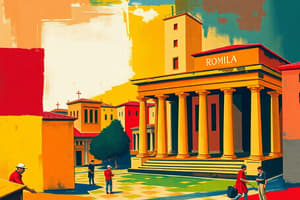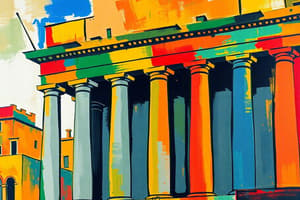Podcast
Questions and Answers
What role did the male head of the household have in Roman society?
What role did the male head of the household have in Roman society?
- Served only as a figurehead
- Had limited authority over finances
- Shared authority with women
- Had absolute authority (correct)
Why were Roman citizens considered good soldiers?
Why were Roman citizens considered good soldiers?
- They received extensive combat education
- They were trained from childhood
- They were mostly professional soldiers
- They valued courage, loyalty, and respect for authority (correct)
What were the responsibilities of Roman soldiers in newly conquered territories?
What were the responsibilities of Roman soldiers in newly conquered territories?
- Establishing local governments only
- Engaging in trade with local populations
- Collecting taxes for the empire
- Posting throughout the land to maintain control (correct)
What was a significant outcome of Rome's treatment of conquered peoples?
What was a significant outcome of Rome's treatment of conquered peoples?
How did Rome contribute to the incorporation of Latin among local peoples?
How did Rome contribute to the incorporation of Latin among local peoples?
Which of the following gods ruled the sky and other gods in Roman mythology?
Which of the following gods ruled the sky and other gods in Roman mythology?
What was the significance of the stone tablets inscribed with laws in Roman society?
What was the significance of the stone tablets inscribed with laws in Roman society?
What role did engineers play in consolidating the Roman Empire?
What role did engineers play in consolidating the Roman Empire?
What does the term 'republic' specifically refer to in the context of Roman government?
What does the term 'republic' specifically refer to in the context of Roman government?
Who were the patricians in Roman society?
Who were the patricians in Roman society?
What role did the tribunes play in the Roman Republic?
What role did the tribunes play in the Roman Republic?
What was the significance of the veto power granted to tribunes?
What was the significance of the veto power granted to tribunes?
Which civilization ruled northern Italy before the rise of the Romans?
Which civilization ruled northern Italy before the rise of the Romans?
What is the basic military unit of the Roman army called?
What is the basic military unit of the Roman army called?
How did geography influence the growth of Rome compared to Greece?
How did geography influence the growth of Rome compared to Greece?
What was a dictator in the context of Roman governance?
What was a dictator in the context of Roman governance?
What significant event occurred in 509 B.C. in Roman history?
What significant event occurred in 509 B.C. in Roman history?
Who were the twin brothers associated with the founding of Rome according to legend?
Who were the twin brothers associated with the founding of Rome according to legend?
What role did the Senate play in the Roman Republic?
What role did the Senate play in the Roman Republic?
How long could a dictator hold power in the Roman Republic during times of war?
How long could a dictator hold power in the Roman Republic during times of war?
What was the primary purpose of establishing a republic according to Roman beliefs?
What was the primary purpose of establishing a republic according to Roman beliefs?
Who were the primary members of the Senate in the Roman Republic?
Who were the primary members of the Senate in the Roman Republic?
What significant contribution did the Etruscans make to Roman civilization?
What significant contribution did the Etruscans make to Roman civilization?
What function did tribunes serve in the Roman Republic?
What function did tribunes serve in the Roman Republic?
Flashcards are hidden until you start studying
Study Notes
Objectives of Roman Civilization
- Describes physical and cultural settings of Roman civilization.
- Outlines structure and governance of the Roman Republic.
- Discusses rights and religious practices in Roman society.
- Explains the growth and maintenance of Roman conquests.
Historical Context
- Etruscans dominated northern Italy before the rise of Rome.
- Rome began as a small city and expanded to control much of the Mediterranean.
Geography and Settlement
- Italy's geography, with fertile plains and central Mediterranean location, facilitated unification.
- Latins migrated to Italy and settled along the Tiber River around 800 B.C.
- Greek colonists and Etruscans influenced Roman engineering and religion.
Foundation of Rome
- Legend attributes the founding of Rome to twin brothers Remus and Romulus, linked to divine heritage from the god Mars.
- In 509 B.C., the Romans expelled Etruscan rulers, establishing a republic, or "res publica."
The Roman Republic Structure
- The Senate consisted of 300 patricians (upper-class landowners).
- Romans believed a republic would prevent concentration of power.
- Two consuls chosen each term to manage government and military operations.
Governance and Leadership
- Consuls served one-year terms and held mutual checks on power.
- In emergencies, a dictator could be appointed for up to six months; example: Cincinnatus.
Rights and Representation
- Plebeians (commoners) elected tribunes who could veto harmful laws, granting them a voice in governance.
- Laws inscribed on stone tablets displayed publicly in the forum for transparency.
Military Organization
- By 270 B.C., Rome had conquered the Italian Peninsula.
- Roman legions consisted of 5,000 citizen soldiers, rewarded with spoils of war.
- Soldier training emphasized courage, loyalty, and respect for authority.
Treatment of Conquered Peoples
- Conquered individuals were often allowed to retain their customs, religions, and local governance.
- Some granted full or partial Roman citizenship, fostering loyalty to Rome.
Consolidation of Power
- Rome established a network of roads to facilitate trade and travel.
- Encouraged the adoption of Latin by local populations, enhancing unity in the empire.
Social Structure
- The family unit was central in Roman society, with the male head having absolute authority.
- Women could own property and run businesses but predominantly managed homes.
- Education for children often involved Greek tutors for wealthier families.
Religious Practices
- Roman mythology reflected Greek mythology with major deities:
- Jupiter: God of the sky.
- Juno: Goddess of marriage.
- Neptune: God of the seas.
- Mars: God of war.
Legacy of Ancient Rome
- Established a system allowing for representation of commoners in government and safeguards for individual rights.
Studying That Suits You
Use AI to generate personalized quizzes and flashcards to suit your learning preferences.





